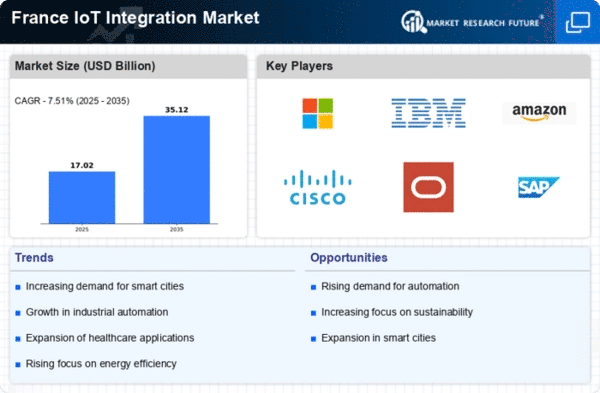Rising Demand for Automation
The iot integration market in France is experiencing a notable surge in demand for automation across various sectors. Industries are increasingly adopting IoT solutions to enhance operational efficiency and reduce costs. According to recent data, the automation sector is projected to grow by approximately 15% annually, driven by the need for real-time data analytics and streamlined processes. This trend is particularly evident in manufacturing and logistics, where IoT integration facilitates predictive maintenance and inventory management. As businesses seek to optimize their operations, the integration of IoT technologies becomes essential, thereby propelling the growth of the iot integration market.
Growing Focus on Data Security
As the iot integration market expands in France, the emphasis on data security becomes increasingly critical. With the rise of connected devices, concerns regarding data breaches and cyber threats are prevalent. Companies are investing in robust security measures to protect sensitive information, which is likely to drive the demand for secure IoT solutions. The market for IoT security is projected to grow by 25% annually, reflecting the urgent need for comprehensive security frameworks. This focus on data protection not only enhances consumer trust but also encourages businesses to adopt IoT technologies, thereby fostering growth in the iot integration market.
Government Initiatives and Support
French government initiatives aimed at promoting digital transformation are significantly impacting the iot integration market. The government has launched various programs to encourage the adoption of IoT technologies, particularly in smart city projects and industrial applications. For instance, the 'France 2030' plan allocates substantial funding to support innovation in IoT, with an emphasis on sustainability and efficiency. This support is expected to drive the market's growth, as businesses leverage government resources to implement IoT solutions. The anticipated increase in public and private sector collaboration could lead to a market expansion of around 20% over the next few years.
Increased Consumer Awareness and Demand
Consumer awareness regarding the benefits of IoT technologies is on the rise in France, significantly influencing the iot integration market. As individuals become more informed about smart home devices and connected solutions, the demand for IoT applications is expected to grow. Market Research Future indicates that the consumer segment of the IoT market could expand by 18% annually, driven by the desire for convenience and enhanced lifestyle experiences. This growing consumer interest encourages businesses to innovate and integrate IoT solutions, thereby contributing to the overall growth of the iot integration market.
Advancements in Connectivity Technologies
The evolution of connectivity technologies, such as 5G and LPWAN, is playing a pivotal role in shaping the iot integration market in France. These advancements enable faster and more reliable communication between devices, which is essential for the effective implementation of IoT solutions. The rollout of 5G networks is expected to enhance the performance of IoT applications, particularly in sectors like transportation and healthcare. As connectivity improves, businesses are likely to invest more in IoT integration, anticipating a market growth of approximately 30% in the coming years. This trend underscores the importance of robust connectivity in driving the adoption of IoT technologies.

















